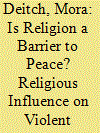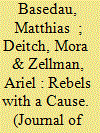|
|
|
Sort Order |
|
|
|
Items / Page
|
|
|
|
|
|
|
| Srl | Item |
| 1 |
ID:
188087


|
|
|
|
|
| Summary/Abstract |
In recent years, a burgeoning literature has emerged on the relationship between religion and conflict. Contradictory theories address the dynamics and termination of religious violent conflicts. Some studies focus on the destructive role of religion, arguing that religious conflicts are longer, more violent, and intractable. Others argue that religion has an ambivalent role, both destructive and constructive, and recognize religion as a force for peacebuilding. This study focuses on the relationship between religion and conflict termination by examining termination outcomes, based on the length and the level of violence, as well as incidents of reoccurrence. The study quantitatively examines 118 domestic conflicts between 1990 and 2014, utilizing the Political Instability Task Force and Religion and State datasets. The findings suggest that religious conflicts are likely to last longer than non-religious ones. However, the study reveals that religion has no strong significant influence on conflict termination as well as on the reoccurrence of conflicts and the violence level.
|
|
|
|
|
|
|
|
|
|
|
|
|
|
|
|
| 2 |
ID:
188825


|
|
|
|
|
| Summary/Abstract |
Ideology may directly provide motive and indirectly capacity for collective violence, thus making armed conflicts longer and bloodier. We investigate these propositions by drawing on an innovative global dataset which codes ideological claims by rebel groups and governments in intrastate armed conflicts since 1946. Results demonstrate that although ideology increases conflict duration, these effects vary by type and timing. Whereas secular ideological conflicts tended to be more protracted during the Cold War, religious ideology has become increasingly important since. We, however, find little evidence that ideology increases conflict intensity. Rather, rebel criminality best accounts for intensity. So, while immaterial resources like ideology sustain willingness to fight, ideology’s influence upon conflict intensity is limited, especially after the Cold War. Future studies need to take ideology seriously and need to investigate its characteristics more in-depth and in conjunction with material, identity related and international variables.
|
|
|
|
|
|
|
|
|
|
|
|
|
|
|
|
|
|
|
|
|